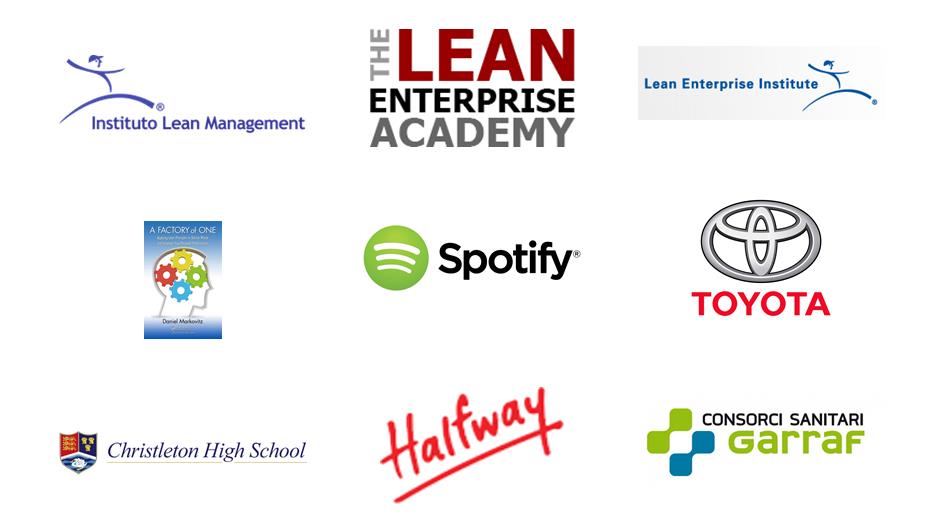
As part of our mission to help organisations with their Lean journeys the Lean Enterprise Academy is holding its annual UK Lean Summit at Chesford Grange Hotel, Kenilworth, UK.
The purpose of the Summit is as follows:
- To raise consciousness of the latest developments in Lean Thinking and Practice
- To provide insight into practical ways to get started, deepen or enhance your Lean journey
- To enable participants to build their own network of Lean Thinkers
We do this by:
- Bringing together the best Lean practitioners and sensei in the Lean world for participants to learn from
- Building time into the programme for participants to network
- Providing a variety of learning situations – including pre-Summit workshops on leading edge topics, keynote talks, interactive learning sessions and panel discussions
- Enabling groups from the same organisations to come to the Summit to learn together
Key questions for this year’s UK Lean Summit
- What are the models of Lean transformation?
- How do you use Lean Transformation Framework (LTF) to transform your business?
- How do I lead and coach the transformation?
- What are the fundamentals required to develop a Lean organisation?
- How do the best companies develop and coach leadership to build capability?
- How can we apply Lean to ourselves?
- How do you apply Lean Thinking beyond operations to sales environments?
- What can the start up and more traditional Lean movements learn from each other?
This is a unique opportunity for the Lean Enterprise Academy’s community to come together.
Scroll down for the full programe
Click the headings below to expand the section
Click LOGIN o (Found on the top right of the website on a PC/Laptop or under the menu icon on smart phones / tablets)
Enter your EMAIL ADDRESS and PASSWORD for your LEA Account (Enter your email and click the forgot password link if you have not yet set this up)
Here’s what the attendees of the 2014 event told us:
- The best place I know to learn about lean
- Chance to see some of the most inspiring and future shaping people in Lean
- The opportunity to network and learn from others is incredibly valuable. To be able to share successes and also to get advise when you are facing setbacks cannot be measured
- This was inspirational for one. Got more out of these two days than I could imagine. Great way to re-invigorate
- Taking time out to surround oneself with the passion and expertise gives both knowledge and renewed enthusiasm for helping other to learn
- I learned so much. It gave me so much energy to be with like minded people and provided motivation to continue to. Its given me space to see my own value and what I need to focus on in the next 12 months too
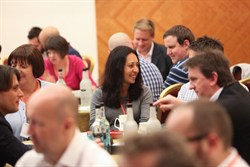
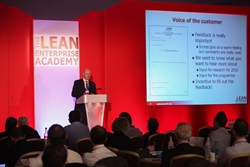
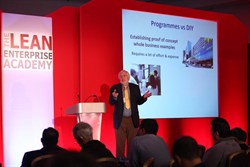
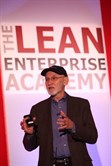
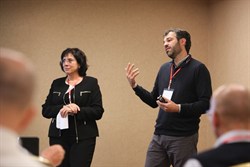
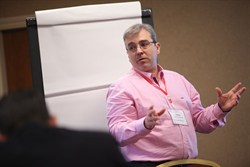
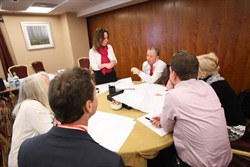
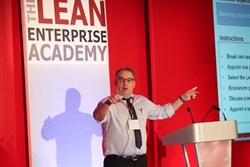
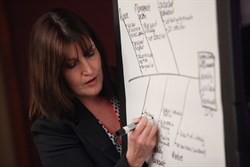
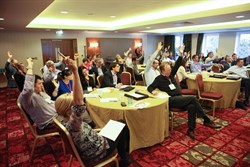
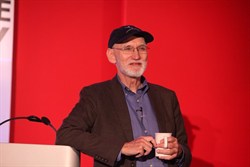
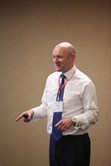
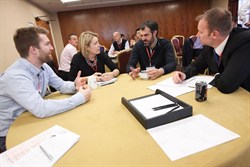
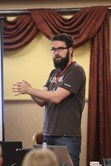
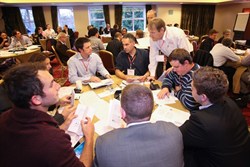
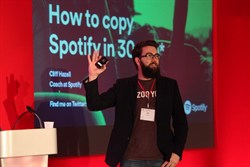
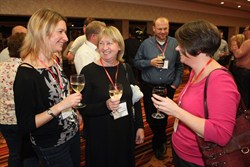
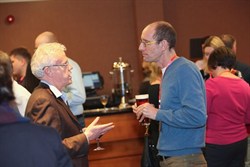
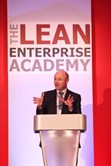
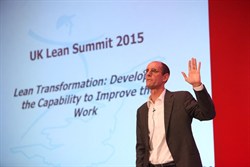
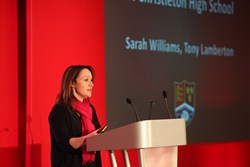
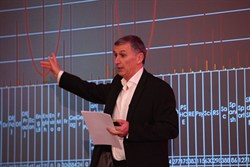
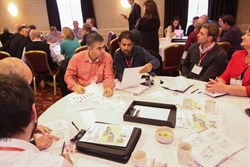
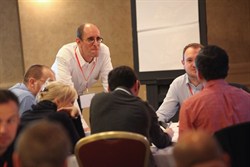
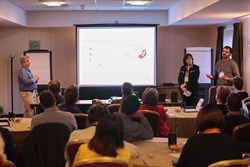
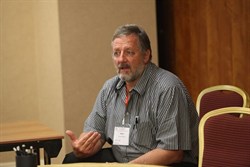
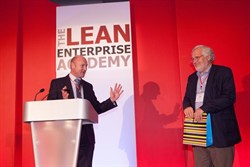
Registration
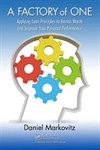
A Factory of One
Only 26 places available
Managerial time and attention – not money – is the scarcest resource any organization has. Yet when you look at most companies (even Lean ones), managerial workflow is riddled with waste and inefficiency.
Up to now, Lean tools have been applied business processes. But what about the waste in the way managers work within those processes? The latitude that managers have to determine their actions each day, and the high degree of unpredictability in their daily work content, is a recipe for waste and inefficiency.
Through lecture, discussion, and exercises, this workshop will teach participants how to apply Lean concepts and tools to their own work to reduce the waste in their day, and increase the amount of time and attention available for creating value. By blending classic organizational and time management techniques with Lean thinking, it will create a seamless extension of what’s being done on the shop floor with what’s being done in the office. These techniques will help drive your company’s Lean initiative from a collection of tools to a way of life – from something you do to something you live.
Topics:
- Normal and abnormal conditions in individual knowledge work
- Value vs. waste: which activities create value, and what’s the best way to perform them?
- 5S: it’s about the information, not the desk.
- Standard work for repetitive work and for communication
- Flow, and the folly of multitasking
- Visual management and kanbans
Note: bring your laptops to this session so that you can immediately apply learning points and ideas to your electronic files and email.
Daniel Markovitz - Author, Factory of One - CRC Press Only 26 places available
Lean Transformation Framework
SOLD OUT
We are all trying to transform. That’s what Lean thinking and practice are all about: challenging us to reflect deeply on how we can improve this situation, improve my organization, or improve myself (and of course, all three.) Each of us knows from experience that this work is never easy. Whether you are toiling at the gemba, struggling with your mid-level team, or fighting to transform your organization, this is tough work.
The Lean Transformation Framework
Better understanding the nature of transformation is core to the mission of LEI today. Sharing this framework with you, and helping others practice and develop it, enables us at LEI to narrow a gap regarding our aim.
Observing efforts in the community over many years – often working with you side-by-side – we have learned that successful transformation calls for a situational approach that is based on innovating key dimensions of any organization through addressing a series of questions.
These questions are fractal—meaning that the same questions apply whether working at the macro enterprise level or the level of individual responsibility as you dive progressively deeper into each dimension. But, while the transformation framework that has emerged through years of experience is situational, the nature of the questions represent a clear point of view: if an organization fails to address each question, and with a sense of how each relates to the others, the transformation is headed for trouble.
Questions of the Lean Transformation Framework
1) What is the purpose of the change–what true north and value are we providing, or simply: what problem are we trying to solve?
2) How are we improving the actual work?
3) How are we building capability?
4) What leadership behaviors and management systems are required to support this new way of working?
5) What basic thinking, mindset, or assumptions comprise the existing culture, and are we driving this transformation?
Fundamentally, the process of successful Lean transformation rests on applying PDCA cycles of experimentation (the art and craft of science) at every level, everywhere, all the time. Being situational means that every story is going to be specific and different (each situation has a different aim or purpose). Being grounded in a common set of principles yet situational in application provides rich opportunity for the development of truly profound wisdom. But, Lean thinking and practice, and Lean transformation, entail more than PDCA alone; the Lean approach to transformation carries some specific value judgments as well.
John Shook - Chairman and CEO, Lean Enterprise Institute
Registration
Welcome and Introduction
Dave Brunt - Chief Executive, LEA
Learning from the History of Lean Transformations
We now have three decades of experiments in creating lean organisations in all kinds of activities. What can we learn from different approaches to lean transformation? How should we evaluate them? Where do they succeed and where do they get stuck? How should we respond to these challenges and obstacles? How does this change the role of leaders, front-line management and the lean team?
Daniel Jones - Chairman, LEA
Using the Lean Transformation Framework to Transform Organisations
John Shook - Chairman and CEO, Lean Enterprise Institute
Coffee, Tea & Networking
Developing Lean in Secondary Education
Share your expertise and shadow the information gathering and methodology in a Lean educational project which transformed a whole learning area and which is being used with DFE support to establish a brand new self improving Studio School. The session will be highly interactive drawing out common themes between participants contexts relating to greater sense of purpose, efficiency and human resource. It will challenge delegates to apply Lean to the most complex human problems in the workplace, visiting core purpose, structure, waste and outcomes.
Tony Lamberton - Executive Headteacher, Christleton High School
Sarah Williams - Head of Student Services, Christleton High School
Lunch
Developing Leadership Capability for the Digital Age
What can we learn from the pioneering Spotify example, which has grown very rapidly based on agile and Lean practices?
Join the discussion with Cliff Hazell to understand their story in depth and its relevance for managing knowledge work in our own organisations.
Daniel Jones will then share his observations on the growing convergence of agile and Lean as we build organisations for the Digital Age.
Cliff Hazell - Agile Coach, Spotify
Daniel Jones - Chairman, LEA
Coffee, Tea & Networking
Leadership, Coaching and Improvement at Spotify
Spotify was founded with an agile and Lean mindset already from the start. Since then they have grown quickly as a company – and they’ve put a lot of effort into not only building a great product, but also building and maintaining a great culture and find new ways of working that helps them become more effective.
Cliff will share some of his key learnings and also personal reflections from that journey.
Cliff Hazell - Agile Coach, Spotify
Networking Reception
Lean Transformations: Learning for the Future
It’s now been over 25 years since thepublication of ‘Machine that Changed the World’, and whilst Lean Thinking has become a proven and effective strategy for improving organisational capability, profitability and competitiveness and most Lean improvement programs almost always deliver some level of improvement (small or large), the majority of businesses still struggle with Lean transformation and creating long term capability to improve the work.
After being involved in numerous improvement journeys from a variety of business sectors, we have developed a greater understanding of an order of approach that supports effective transformation and 3 common pitfalls that must be avoided should you wish to improve the effectiveness of your Lean business system and increase your business performance.
This learning session will provide delegates with:
- An overview of the common approaches to Lean transformation and business improvement
- An understanding of the 3 common pitfalls to Lean transformation
- Examples of good and bad practices employed by some on their Lean journeys
- A greater understanding of the key elements of the Lean Transformation Framework in relation to their Lean journey
- Identify where they are on their Lean Journey and what common pitfalls lie ahead
Darren Walsh - Lean Coach, LEA
Applying Lean Thinking in Sales Environments
The purpose of this learning session is to highlight the business opportunities of applying Lean Thinking in Sales. During this time you will be exposed to the potential implementation of lean in sales by using John Shook’s Lean Transformation Model.
The use of Lean Thinking in the sales and servicing of vehicles has been gaining momentum over the last few years. We now have examples of dealers in Norway, Brazil, South Africa, Switzerland, the Canary Islands and the U.K. applying Lean Thinking across their businesses drawing upon the research we published in our book “Creating Lean Dealers” in 2007. Whilst these organisations started in the service and repair areas of their businesses each has found that Lean Thinking applies to sales.
The use of lean in sales can be implemented beyond the car industry and the insights gained from the work done so far will be shared in this session.
Through instruction, small group discussions and exercises, participants will learn:
- How lean thinking can be used to solve business problems.
- How to see sales as a process – and measure the process.
- The role of the sales manager in lean sales.
- How sales can help develop a plan for every customer and a plan for every product.
- How sales can help smooth the flow of operations.
Terry O'Donoghue - Chief Operating Officer, Halfway Toyota
Dave Brunt - Chief Executive, LEA
Simplifying Lean and Applying it to Yourself
This learning session will introduce participants how to apply Lean concepts and tools to their own work to reduce the waste in their day, and increase the amount of time and attention available for creating value. By blending classic organizational and time management techniques with Lean thinking, it will create a seamless extension of what’s being done on the shop floor with what you do on a daily basis in your office. These techniques will help drive your company’s Lean initiative from a collection of tools to a way of life – from something you do to something you live.
Topics:
- Normal and abnormal conditions in individual knowledge work
- Value vs. waste: which activities create value, and what’s the best way to perform them?
- 5S: it’s about the information, not the desk.
- Standard work for repetitive work and for communication
- Flow, and the folly of multitasking
- Visual management and kanbans
Daniel Markovitz - Author, Factory of One - CRC Press
Developing Capability
John Shook - Chairman and CEO, Lean Enterprise Institute
How to do Lean Transformation Yourself in Healthcare – The Garraf Healthcare Consortium, Barcelona
The CSG, part of the public healthcare network, was created in 2009, as a result of the union of 3 long-history institutions. Nowadays is formed by two hospitals, one social care center, one chronic care center and a rehabilitation center. The first strategy was to expand and become bigger and better and start the construction of a new hospital, but in 2010 the government reduces the salaries by 5% and the CSG budget by 5 million euro. At the end of 2011 and bearing in mind this situation, we start to work on a new Strategic Plan to redirect our activities.
How to tackle this strategic challenge we had set ourselves? Lean could help us as it integrated and took into consideration everything we were looking for. The effectiveness, the Just In Time, the safety and above all the respect for people.
Moreover, included in its principals are all the aspects we had in our strategic plan: Direct the processes to the needs of the patients, efficiency in the processes, continual improvement and everything that had to be done from below, in other words it had to be the professionals themselves who were implicated and capable of doing it.
In all the projects we followed the same process of the Lean principles:
First understand what is happening, what is the problem?, second Standardize and stabilize ensure the sustainability of the project and the start the continuous improvements.
How did we do? What steps did we take?
- Creating am internal team of experts
- Training:
- Advanced Lean Healthcare Training [Team of experts (15 people)]
- Basic Lean Healthcare Training [all Intermediate managers (80 people)]
- 30 minutes Lean Healthcare [All professionals]
- Identify the areas for improvement ad the road map.
- A3 process for each area with a team mixed with internal experts and unit professionals. Mapping Initial State, observations, analysis, proposals… and DO!
- Continuous Check and Act, to sustain.
This session will explore which areas we have reached, the results we have achieved and how.
Rosa Simón - Lean Manager, Consorci Sanitari del Garraf
Dr Llorenç Mateo - Head of Service for Traumatology, Consorci Sanitari del Garraf
Oriol Cuatrecaasas - Founder and Lean Development, Instituto Lean Management
TPS Fundamentals, the Role and Development of Standardised Work
Standardisation and Kaizen form the platform that supports the Toyota Production System. Without clear standards it is impossible for people to judge if a situation is normal or abnormal. In this situation how can we ever be certain our actions are adding value to a process and not just creating more waste? Without a clear standard how can an employee be certain they are meeting the expectations of their supervisors?
Standardised work is one of the tools of standardisation and creates the opportunity for Kaizen. It organises and defines process steps and human movements. This is important because when a process is disorganised there is no baseline for evaluation, improvements are unclear and difficult to monitor and true Kaizen is impossible!
Form the workshop delegate will:
- Understand what to study at the worksite
- Identify waste, value added and non value added activities
- Elements how to redesign the worksite to ensure Safety, Quality and Productivity
- Understand what’s required to create a Kaizen plan to eliminate waste
Ian Hurst - Principle Engineer, Toyota Motor Manufacturing (UK)
Keith Edwards - Section Manager, Toyota Motor Manufacturing (UK)
Introduction to Day 2
Dave Brunt - Chief Executive, LEA
Start with Youself - Applying Lean to Our Own Work
The typical Toyota assembly line makes thousands of operational changes each year. How much have you changed the way you work in the past decade? If you want to drive Lean through your organization, you’ve got to start with yourself—and that means fundamentally changing the way you work. This plenary talk will provide a different perspective on how and what you do each day at the office, and challenge you to apply Lean concepts and Lean thinking to increase the value and reduce the waste in your daily activities.
Daniel Markovitz - Author, Factory of One - CRC Press
Using Lean Thinking in Secondary Education - The Christleton High School Story
Tony Lamberton - Executive Headteacher, Christleton High School
Sarah Williams - Head of Student Services, Christleton High School
Coffee, Tea & Networking
Developing Lean in Secondary Education
Share your expertise and shadow the information gathering and methodology in a Lean educational project which transformed a whole learning area and which is being used with DFE support to establish a brand new self improving Studio School. The session will be highly interactive drawing out common themes between participants contexts relating to greater sense of purpose, efficiency and human resource. It will challenge delegates to apply Lean to the most complex human problems in the workplace, visiting core purpose, structure, waste and outcomes.
Tony Lamberton - Executive Headteacher, Christleton High School
Sarah Williams - Head of Student Services, Christleton High School
Lunch
Developing Leadership Capability for the Digital Age
What can we learn from the pioneering Spotify example, which has grown very rapidly based on agile and Lean practices?
Join and discussion with Cliff Hazell to understand their story in depth and its relevance for managing knowledge work in our own organisations.
Daniel Jones will then share his observations on the growing convergence of agile and Lean as we build organisations for the Digital Age.
Cliff Hazell - Agile Coach, Spotify
Daniel Jones - Chairman, LEA
Coffee, Tea & Networking
Tying the Learning from the Last Two Day Together
John Shook - Chairman and CEO, Lean Enterprise Institute
It’s now been over 25 years since thepublication of ‘Machine that Changed the World’, and whilst Lean Thinking has become a proven and effective strategy for improving organisational capability, profitability and competitiveness and most Lean improvement programs almost always deliver some level of improvement (small or large), the majority of businesses still struggle with Lean transformation and creating long term capability to improve the work.
After being involved in numerous improvement journeys from a variety of business sectors, we have developed a greater understanding of an order of approach that supports effective transformation and 3 common pitfalls that must be avoided should you wish to improve the effectiveness of your Lean business system and increase your business performance.
This learning session will provide delegates with:
- An overview of the common approaches to Lean transformation and business improvement
- An understanding of the 3 common pitfalls to Lean transformation
- Examples of good and bad practices employed by some on their Lean journeys
- A greater understanding of the key elements of the Lean Transformation Framework in relation to their Lean journey
- Identify where they are on their Lean Journey and what common pitfalls lie ahead
Darren Walsh - Lean Coach, LEA
Applying Lean Thinking in Sales Environments
The purpose of this learning session is to highlight the business opportunities of applying Lean Thinking in Sales. During this time you will be exposed to the potential implementation of lean in sales by using John Shook’s Lean Transformation Model.
The use of Lean Thinking in the sales and servicing of vehicles has been gaining momentum over the last few years. We now have examples of dealers in Norway, Brazil, South Africa, Switzerland, the Canary Islands and the U.K. applying Lean Thinking across their businesses drawing upon the research we published in our book “Creating Lean Dealers” in 2007. Whilst these organisations started in the service and repair areas of their businesses each has found that Lean Thinking applies to sales.
The use of lean in sales can be implemented beyond the car industry and the insights gained from the work done so far will be shared in this session.
Through instruction, small group discussions and exercises, participants will learn:
- How lean thinking can be used to solve business problems.
- How to see sales as a process – and measure the process.
- The role of the sales manager in lean sales.
- How sales can help develop a plan for every customer and a plan for every product.
- How sales can help smooth the flow of operations.
Terry O'Donoghue - Chief Operating Officer, Halfway Toyota
Dave Brunt - Chief Executive, LEA
Developing Capability
John Shook - Chairman and CEO, Lean Enterprise Institute
Simplifying Lean and Applying it to Yourself
This learning session will introduce participants how to apply Lean concepts and tools to their own work to reduce the waste in their day, and increase the amount of time and attention available for creating value. By blending classic organizational and time management techniques with Lean thinking, it will create a seamless extension of what’s being done on the shop floor with what you do on a daily basis in your office. These techniques will help drive your company’s Lean initiative from a collection of tools to a way of life – from something you do to something you live.
Topics:
- Normal and abnormal conditions in individual knowledge work
- Value vs. waste: which activities create value, and what’s the best way to perform them?
- 5S: it’s about the information, not the desk.
- Standard work for repetitive work and for communication
- Flow, and the folly of multitasking
- Visual management and kanbans
Daniel Markovitz - Author, Factory of One - CRC Press
TPS Fundamentals, the Role and Development of Standardised Work
Standardisation and Kaizen form the platform that supports the Toyota Production System. Without clear standards it is impossible for people to judge if a situation is normal or abnormal. In this situation how can we ever be certain our actions are adding value to a process and not just creating more waste? Without a clear standard how can an employee be certain they are meeting the expectations of their supervisors?
Standardised work is one of the tools of standardisation and creates the opportunity for Kaizen. It organises and defines process steps and human movements. This is important because when a process is disorganised there is no baseline for evaluation, improvements are unclear and difficult to monitor and true Kaizen is impossible!
Form the workshop delegate will:
- Understand what to study at the worksite
- Identify waste, value added and non value added activities
- Elements how to redesign the worksite to ensure Safety, Quality and Productivity
- Understand what’s required to create a Kaizen plan to eliminate waste
Ian Hurst - Principle Engineer, Toyota Motor Manufacturing (UK)
Keith Edwards - Section Manager, Toyota Motor Manufacturing (UK)
How to do Lean Transformation Yourself in Healthcare – The Garraf Healthcare Consortium, Barcelona
The CSG, part of the public healthcare network, was created in 2009, as a result of the union of 3 long-history institutions. Nowadays is formed by two hospitals, one social care center, one chronic care center and a rehabilitation center. The first strategy was to expand and become bigger and better and start the construction of a new hospital, but in 2010 the government reduces the salaries by 5% and the CSG budget by 5 million euro. At the end of 2011 and bearing in mind this situation, we start to work on a new Strategic Plan to redirect our activities.
How to tackle this strategic challenge we had set ourselves? Lean could help us as it integrated and took into consideration everything we were looking for. The effectiveness, the Just In Time, the safety and above all the respect for people.
Moreover, included in its principals are all the aspects we had in our strategic plan: Direct the processes to the needs of the patients, efficiency in the processes, continual improvement and everything that had to be done from below, in other words it had to be the professionals themselves who were implicated and capable of doing it.
In all the projects we followed the same process of the Lean principles:
First understand what is happening, what is the problem?, second Standardize and stabilize ensure the sustainability of the project and the start the continuous improvements.
How did we do? What steps did we take?
- Creating am internal team of experts
- Training:
- Advanced Lean Healthcare Training [Team of experts (15 people)]
- Basic Lean Healthcare Training [all Intermediate managers (80 people)]
- 30 minutes Lean Healthcare [All professionals]
- Identify the areas for improvement ad the road map.
- A3 process for each area with a team mixed with internal experts and unit professionals. Mapping Initial State, observations, analysis, proposals… and DO!
- Continuous Check and Act, to sustain.
This session will explore which areas we have reached, the results we have achieved and how.
Rosa Simón - Lean Manager, Consorci Sanitari del Garraf
Oriol Cuatrecaasas - Founder and Lean Development, Instituto Lean Management
Dr Llorenç Mateo - Head of Service for Traumatology, Consorci Sanitari del Garraf